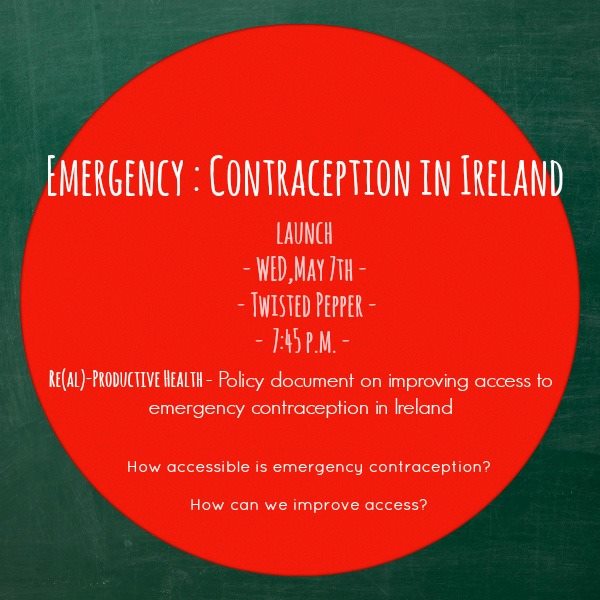Matthew Mulligan
Editor-at-Large
The Twisted Pepper last night played host to the launch of Emergency: Contraception in Ireland, a policy by the group Re(al)-Productive Health. The group submitted their policy suggestions to health organisations including the HSE, the Irish Pharmacy Union and others. The launch featured a speech by Leslie Sherlock of the Irish Family Planning Association and a display of artwork commissioned for the event.
The policy paper contains proposals to improve access to emergency hormonal contraception, especially regarding the behind-the-counter status of the drug in pharmacies and the irregular pricing of the drug that has also been encountered around the country.
Aoife Campbell, one of the founders of Re(al)-Productive Health says that one of the goals of their work was the investigate just how freely accessible the morning after pill is. The drug is available behind the counter, when requested from a pharmacist but cannot be picked up directly from the pharmacy shelf. Campbell said that “the consultation process can be used as an excuse for why the pill costs so much, but actually there is no legal provision for a consultation. The reason why we have it is because Boots Pharmacist came in when a prescription was needed for the pill before 2011. Boots said that for them a prescription wasn’t needed but a consultation was required.”
Though the morning after pill is legally available in Ireland, under the Pharmaceutical Society of Ireland’s current Code of Conduct, pharmacists may refuse outright to dispense the it “if supply to a patient is likely to be affected by the personal moral standards of a pharmacist”. The pharmacy must then take “reasonable” action to facilitate the patient in accessing the information or services required. The removal of the conscientious objection clause is one of the proposals from Re(al)-Productive Health.
Pricing and availability were other aspects of the current situation that the proposals touch upon. The survey results included in the document show that those purchasing the drug around the country may pay anywhere from ten euro to €45, with over 21% of their survey respondents having paid between €30-€35. An issue raised around this erratic pricing was that for an unemployed person under 25 years of age, this would be a significant chunk of their social welfare.
Campbell and her co-founder Fiona Dunkin are both recent college graduates, and they had some advice for other young people who wish to become involved in policy and political change.
“When you have a grassroots organisation, you can make networks and you can get a huge amount of support from other grassroots groups and NGOs. It’s about having that conversation with friends about what you’re frustrated with and then just doing it, and asking people and learning and being active.”
Re(al)-Productive Health, launched in September 2013, seeks to provide a platform for debate and discussion on issues relating to emergency contraception and to reproductive and sexual health generally in Ireland.






